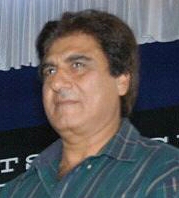Top Qs
Timeline
Chat
Perspective
Raj Babbar
Indian actor and politician (born 1952) From Wikipedia, the free encyclopedia
Remove ads
Raj Babbar (born 23 June 1952) is an Indian Hindi and Punjabi film actor and politician belonging to Indian National Congress. He is a three-time member of the Lok Sabha and a two-time member of the Rajya Sabha. He was the state President of Uttar Pradesh Congress Committee.[1]
Remove ads
Early life and education
Babbar was born in Tundla, Uttar Pradesh, into a Punjabi Hindu a Sunar family on 23 June 1952.[2] His family had settled in Tundla after the partition of India.[3] Their ancestral roots lie in Jalalpur Jattan, a city now located in the Gujrat District of Punjab in modern-day Pakistan.[4]
He did his initial schooling from Mufid-E-Aam Inter college, Agra. He is an alumnus of the 1975 class of the National School of Drama (NSD) and graduate from Agra College.[5][6]
Remove ads
Acting career
Summarize
Perspective
Films
Hindi
He trained in the method school of acting at the NSD, which also involved street theatre. After training in New Delhi, he moved to Bombay and started his film career with Reena Roy, one of the most well-known actresses of the 1970s. He gained notoriety for his horrific portrayal of a rapist in B. R. Chopra's Insaf Ka Tarazu, in which he assaulted the heroine Bharti Saxena, played by Zeenat Aman and her sister Neeta, played by Padmini Kolhapure and in the end, is shot and killed by Bharti. He then became a consistent feature of the B. R. Chopra banner and appeared in Nikaah with Deepak Parashar and Salma Agha and in Aaj Ki Aawaz with Smita Patil.
Punjabi
He also achieved success in Punjabi cinema as he gave remarkable performances in Chann Pardesi (1980), Marhi Da Deeva (1989), and Long Da Lishkara (1983) – three arthouse films with serious themes treated realistically, and this was an innovation for the Punjabi film field. He also appeared in the Punjabi hit films Aasra Pyar Da (1983), Mahaul Theek Hai (1999), Shaheed Uddham Singh (1999), Yaaran Naal Baharan (2005), Ek Jind Ek Jaan (2006), Apni Boli Apna Des (2009) and Tera Mera Ki Rishta (2009). He appeared in several films as a villain in movies like Insaf Ka Tarazu (1980), Saazish (1988), Aankhen (1993), Dalaal (1993), The Gambler (1995), Andaz (1994), Yaarana (1995), Barsaat (1995), Ziddi (1997), Gundagardi (1997), Daag: The Fire (1999), Indian (2001) and many more, some films became successful, but some were commercial flops.
Television series
He has also appeared on television. He appeared in the introductory episodes of the famous Indian TV series Mahabharat, as King Bharat, Bahadur Shah Zafar (1986) as Akbar, alongside debutant Juhi Chawla, and also in his home production; Maharaja Ranjit Singh (2010), all telecast on Doordarshan. In 2014 and 2015, he appeared in the serial telecast on Life OK; Pukaar - Call For The Hero, directed by Vipul Amrutlal Shah, with Rannvijay Singh, Adah Sharma and Shubhangi Latkar.
Remove ads
Political career
Summarize
Perspective
Raj Babbar entered politics by joining Janata Dal in 1989, which was led by V. P. Singh.
From 1994 to 1999 he was a member of the Rajya Sabha. He was re-elected in the 14th Lok Sabha elections for his second term in 2004. He was suspended from Samajwadi Party in 2006. Later he joined Indian National Congress in 2008 and was elected for his fourth term as Member of Parliament in 2009, by defeating Dimple Yadav, wife of Akhilesh Yadav and daughter-in-law of Mulayam Singh Yadav.[7] In the 2014 Lok Sabha elections, he contested from Ghaziabad and lost to General V. K. Singh.[8] He was appointed as the president of Uttar Pradesh congress committee (UPCC), but in 2019 elections he couldn't even manage to save his own seat and lost to Rajkumar Chahar of the Bharatiya Janata Party by a huge margin of 4,95,065 votes.
Raj Babbar, in the capacity of Congress spokesman, created controversy in 2013, by stating that Rs.12 is sufficient for a common man to get a full meal in Mumbai, which drew severe criticism.[9] He also said that a poor person in India can get full meals two times a day, within Rs. 28 to 32 and opposition parties termed Raj Babbar's statement laughable.[9] Later, he regretted his comments.[10] In July 2013, he compared Narendra Modi to Adolf Hitler, which also created controversy.[11]
In the 2024 Indian general election, Raj Babbar contested from the Gurgaon Lok Sabha constituency on Indian National Congress ticket. In a tight contest, Bharatiya Janata Party (BJP) candidate and Union Minister Rao Inderjit Singh registered his fourth straight win from the Gurgaon Lok Sabha constituency, defeating Raj Babbar by 75,079 votes.[12][13]
Personal life

He is married to Nadira Zaheer, daughter of noted progressive Urdu writer Sajjad Zaheer. The couple have two children together; a son named Arya Babbar and a daughter named Juhi Babbar. He was also married to actress Smita Patil from 1983 to her death in 1986, with whom he has a son named Prateik Babbar.
He has two younger brothers, Kishan and Vinod (deceased) and four younger sisters. Babbar's niece Kajri Babbar is an upcoming filmmaker.[14][15][16][17]
He launched his own home production; Babbar Films Pvt. Ltd. along with his brother Kishan. Under it, he has produced two films, Karm Yodha (1992) and Kash Aap Hamare Hote (2003), and also the TV serial Maharaja Ranjit Singh (TV series) (2010).
Remove ads
Awards and nominations
- 1981: Nominated: Filmfare Award for Best Actor for Insaf Ka Tarazu
- 1984: Nominated: Filmfare Award for Best Supporting Actor for Agar Tum Na Hote
- 1985: Nominated: Filmfare Award for Best Actor for Aaj Ki Awaaz
- 1994: Nominated: Filmfare Award for Best Performance in a Negative Role for Dalaal
- 1996: Nominated: Filmfare Award for Best Performance in a Negative Role for Yaraana
Filmography
Films
Television
Remove ads
References
External links
Wikiwand - on
Seamless Wikipedia browsing. On steroids.
Remove ads


